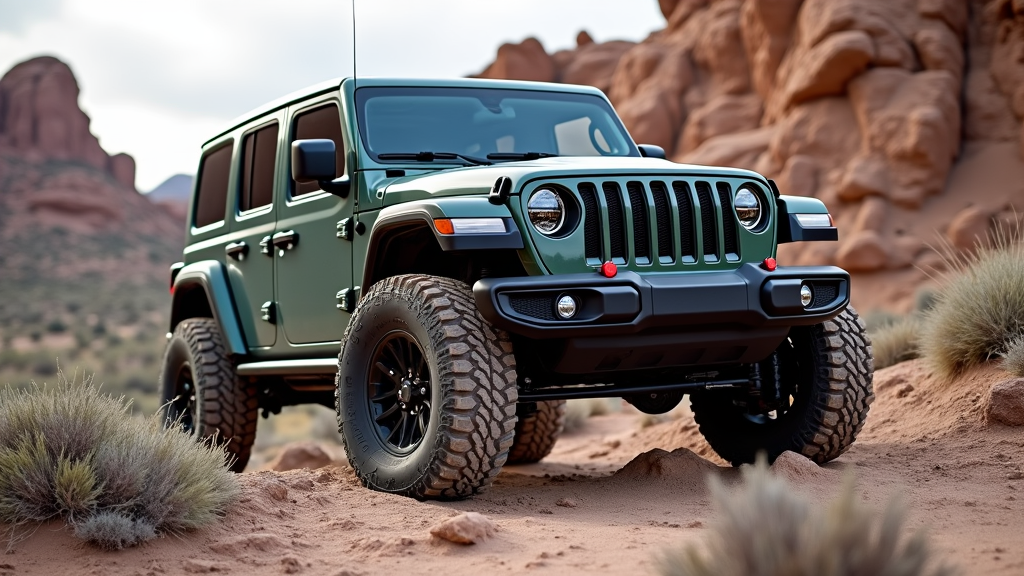Jeep Wranglers are renowned for their off‐road capabilities and rugged performance. Choosing the right all‐terrain tires directly impacts your Jeep’s ability to tackle challenging trails, rocky paths, and highways. Over the years, I have spent extensive time researching and testing tire options, which has provided me with valuable insights when making informed decisions about tire choices.

Essential Features of All-Terrain Tires for Jeep Wranglers
All‐terrain tires strike a practical balance between on‐road comfort and off‐road grip. The correct tire can take up a notch in your vehicle’s performance while improving safety. A well‐designed tread pattern is essential because it must provide dependable traction on sandy, rocky, or muddy surfaces while still delivering a smooth ride on highways. Manufacturers combine durable rubber compounds that resist wear and tear in extreme conditions. Many high‐quality models perform reliably in both cold and warm weather.
Some tires come with additional benefits such as reinforced sidewalls and optimized voids to absorb impacts on uneven surfaces. Evaluating these extra features helps you decide whether a tire meets your everyday driving demands as well as your off‐road challenges. In short, a careful look at these design elements ensures that you select tires that support safe, confident driving in diverse conditions.
Understanding Tire Specifications and Key Features
Before settling on a tire model, it is important to understand a few key specifications that influence performance. Focus on details like the tread design, load and speed ratings, and the tire’s size. Each of these specifications plays a role when your Jeep faces rough conditions. To simplify the process, here are some key terms to know:
- Tread Depth: This is a measure of the grooves in the tire. A deeper tread typically means better grip off‐road.
- Sidewall Strength: Robust sidewalls help defend the tire against punctures and damage from rocky surfaces.
- Traction Rating: This rating indicates how well the tire can grip various surfaces such as mud, snow, and dry pavement.
Reviewing these details simplifies your decision‐making, ensuring that the tire you choose supports both daily driving and off‐road adventures.
A Clear Guide to Choosing the Right Tire
Selecting the best all‐terrain tire for your Jeep Wrangler can seem daunting at first glance. Breaking the process into manageable steps has always helped me. Based on personal experience, here is a straightforward guide:
- Identify Your Needs: Consider your typical driving conditions. If you plan on serious off‐roading, opt for tires featuring aggressive tread patterns.
- Select the Appropriate Size: Confirm that the tire size matches your Jeep’s specifications. A quick check in your vehicle manual along with tire reviews can clear up any doubts.
- Review Tread Life and Warranty: A long tread life and a solid warranty add assurance to long‐term performance.
- Examine Performance Feedback: Gather input from auto experts and community forums. Real-world experiences reveal how a tire holds up under various conditions.
- Set a Realistic Budget: Tire prices can vary considerably. Balancing cost with quality is very important when making your decision.
By following these clear steps, you can narrow down your choices based on objective criteria rather than relying solely on brand names or appearance.
Key Considerations Before Investing in All-Terrain Tires
Modifying your Jeep demands thoughtful planning. My own experiences have shown that buying new tires requires looking beyond surface features to understand how they affect overall performance. Key factors include durability, ride comfort, noise levels, and even fuel efficiency.
- Durability: Tire lifespan depends on factors such as the tread compound and overall design. Knowing what to expect can help you decide on the right option.
- Ride Comfort: Even off‐road tires must offer a smooth ride on highways. It’s important to balance aggressive performance with everyday comfort.
- Noise Levels: Aggressive tread patterns sometimes produce more noise. Think about how much time you spend on paved roads when weighing this trade-off.
- Fuel Efficiency: More rugged tires can increase rolling resistance, which might slightly affect fuel economy.
A balanced look at these factors before purchase helps reduce potential pitfalls. This careful assessment ensures your investment meets both daily driving and adventurous off‐road needs.
Durability and Tread Life
Durability is really important when selecting all‐terrain tires. Tires built to last deliver years of reliable performance if properly maintained. In my experience, options that feature a deep tread and high‐quality compounds withstand both rough trails and high-speed highway driving. Checking warranty details and tread life guarantees can further reveal a tire’s long‐term value, helping you decide if it justifies its price tag.
Ride Comfort and Noise
While off‐road performance is essential, ride comfort should not be overlooked. Tires with aggressive tread patterns may sometimes compromise smoothness on asphalt. I always take the time to read consumer feedback regarding ride quality and noise levels. These practical evaluations provide a real-world picture of performance, which is crucial when using your Jeep for daily commuting as well as for adventures.
Impact on Fuel Efficiency
The design of a tire can subtly affect fuel economy. While all‐terrain tires might add a bit of rolling resistance, the resulting decrease in fuel efficiency is usually minimal compared to the benefits in off‐road traction. By carefully balancing rugged performance with efficient design, you can enjoy both reliable off‐road capability and economic on‐road driving.
Advanced Tips and Tricks for Optimizing Tire Performance
Once you have selected tires that fit your basic needs, there are additional steps you can take to get the most out of your investment. Regular maintenance is one of the simplest yet most effective ways to keep your tires performing at their best. Checking tire pressure, scheduling routine rotations, and timely replacements are all practices that help extend tire life. I always check my tire pressure before jumpstarting long trips or off‐road adventures, ensuring optimal performance on every drive.
Furthermore, monitoring mileage and tread depth guarantees that replacements occur only when absolutely necessary. In some cases, adjusting the alignment from factory defaults can lead to improved handling. These practical tips not only prolong tire life but also contribute to a more enjoyable driving experience.
The Basics: What to Look for in All-Terrain Tires
When searching for the ideal tire, focusing on core components is key. Here are a few essentials that should guide your purchase:
- Tread Pattern: A versatile groove design is a solid indicator that a tire can handle various conditions—from aggressive off‐road challenges to smooth highway rides.
- Size and Fitment: Ensuring the tire perfectly matches your Jeep Wrangler’s specifications is crucial. The right fit helps avoid installation issues and ensures optimal performance.
- Load and Speed Ratings: These ratings reveal how resilient the tire is when the vehicle is at full load or moving at high speeds.
- Customer Feedback: Reviews from other Jeep owners can offer valuable insights into a tire’s real-world performance.
This streamlined list of basics is a great starting point. By concentrating on these crucial aspects, you not only save time but also help ensure that your investment will provide balanced performance across different driving conditions.
Frequently Asked Questions
Below are some common questions about all‐terrain tires for Jeep Wranglers along with concise answers to help guide your selection process.
Question: Which all‐terrain tire is best for both highways and rugged trails?
Answer: I recommend tires that offer a balanced tread design. Look for models with deep grooves for off‐road grip while maintaining a pattern that minimizes road noise and enhances comfort.
Question: How do I ensure that new tires are compatible with my Jeep Wrangler?
Answer: It is vital to check your vehicle specifications and confirm that the tire size and load ratings match. Reviews and forum feedback from fellow Jeep owners can offer useful guidance.
Question: What maintenance practices help extend tire life?
Answer: Regularly checking tire pressure, rotating tires, and following manufacturer recommendations are practices I rely on. Keeping an eye on tread depth is also key.
Question: Do all‐terrain tires significantly impact fuel economy?
Answer: Typically, any decrease in fuel efficiency is minimal when compared to the improved off‐road performance they provide.
Wrapping Up
Choosing the best all‐terrain tires for your Jeep Wrangler involves understanding your vehicle’s needs and how various tire features affect performance. From a well‐crafted tread design that excels on rough terrain to the durability required for long-lasting performance, every element plays a role in ensuring your Jeep can handle diverse surfaces safely.
After extensive testing and careful review of user feedback, I am convinced that the right tires can transform your Jeep’s performance. Whether navigating rocky trails or cruising on highways, properly chosen tires boost safety, improve handling, and offer a more enjoyable ride.
Investing in high‐quality all‐terrain tires paves the way for countless off‐road adventures while still delivering dependable on‐road performance. Your Jeep Wrangler deserves tires that are as tough and reliable as your adventurous spirit. Take advantage of available resources, compare options carefully, and get ready to hit the road with confidence.
